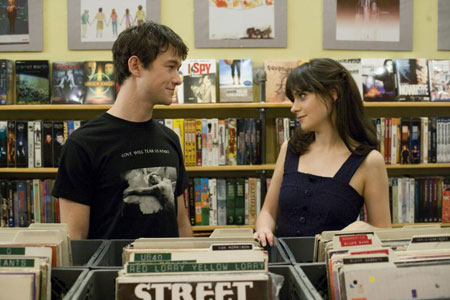(500) Days of Summer

The film begins with the funniest disclaimer I’ve seen in a long time. After the usual verbage about characters not resembling any “persons living or dead, and are purely fictional,” the next frame reads, “Especially you, Jenny Beckman.”
It starts with the usual meet cute, on a park bench, and steps back through history to give us vignettes of Tom (Joseph Gordon-Levitt), whose life is the result of a “misread of The Graduate,” and Summer (Zooey Deschanel) who is the fated object of Tom’s affections. I use the word “object” here because that’s the way Tom sees her, and that’s central to the film’s biggest misstep, in my opinion. But more on that in a moment.
The opening credits, with its color-aged flashbacks, utilizes a split-screen technique to tell us about their lives in parallel while staccato piano chords chug on as a schmaltzy, indie-flick metaphor for the passage of time. We then find Tom in his apartment breaking plates, immediately suggesting that something about the relationship (the narrator insists this is not a love story) has gone horribly awry. He has just broken up with Summer, his co-worker at a greeting card company where he writes one-liners. He receives counsel from his little sister Rachel (Chloe Moretz), an exceptionally insightful child with social wisdom that couldn’t be explained by her time on this earth—another walking cliché of the modern independent film.
The film revels in the hip witticisms that swim mostly inside a writer’s head but never come forth in the real world with the timing and execution seen here. It reminds me a bit of the excessively clever aphorisms strewn throughout Juno—written by Diablo Cody as if every character spoke in the same voice. However, the talented Mr. Gordon-Levitt does a good job of distancing his delusionally-infatuated character from the blithe Summer, “They used to call me anal girl,” referring to her attention to detail and not her sexual proclivities.
Much of the film is spent not really examining the nature of relationships and what makes them stick, or what makes them fail, but instead reveling in the humorous banter. Funny? Yes. There’s even time for a Hall & Oates musical number that channels the choreographed (and equally improbable) spontaneous dance sequence from Ferris Bueller’s Day Off—with a few white people this time, making our smile slightly less tepid. The effect is less Fellini than Hughes.
In my review of I Love You, Beth Cooper, I noted that Gondry’s superlative meditation on relationships in Eternal Sunshine of the Spotless Mind cut right to the core of why relationships last or fail. It hinges on the ability to see past your own concept of a person. Tom never gets past his concept of Summer, and I suppose that’s the point, but the film doesn’t get out of second gear either. It’s reduced to a comedy that, because of its gen-Y demeanor (whose protagonist, as a director’s conceit, is always dressed as if he’s in a French new wave flick) and its freshman director (Marc Webb, coming straight off the heels of music videos) falls back heavily on montage, constant witticism, cynicism and self-awareness in place of an evolving narrative and character development.
Yes, the flip-flops back and forth in the timeline are cute, but no cuter than the “Day x” title inserts that demarcate them. They aid Webb in trying to obfuscate the fact that the characters never fundamentally change. By the time Tom realizes his failure, he hasn’t grown as a man, and we don’t know more about him than we did in the first scene. But Mr. Gordon-Levitt hits his marks, such as a hilarious sequence in which his work life starts to unravel after splitting with Summer. After penning a particularly dry card (“Roses are red, violets are blue. Fuck you, whore.”), his manager encourages him to channel his negative energy into grief themes for funerals, etc. Suffice it to say there has never been a more ingenious manager, fictional or otherwise. Ms. Deschanel is excellent at portraying ambivalence but this makes the character no more interesting than styrofoam in a wig. In her final act of abject insensitivity, Summer has the unrealistic audacity to give Tom absolutely no “oh by the way” forewarning that she’s completely flipped on her principles of noncommitment before the the proverbial shoe hits him in the face. This rail thin skeleton of a character, with no redeeming traits or nuances whatsoever, is perhaps just a 90-minute setup for the closing punchline.
I hope Webb learns from his mistakes and produces a film with more richness of detail than the facade erected over the standard, soulless rom-com sellout, disguised in urban hipster tones. This one hits the laugh buttons for an hour and a half and then leaves you with nothing to think about as you walk out the theater.
(500) Days of Summer opens in limited engagement Friday, July 17th at Angelika Dallas, AMC Northpark & Angelika Plano.
 (500) Days of Summer • Dolby® Digital surround sound in select theatres • Running Time: 95 Minutes • Aspect Ratio: 2.35:1 • MPAA Rating: PG-13 for sexual material and language. • Distributed by Fox Searchlight Pictures
(500) Days of Summer • Dolby® Digital surround sound in select theatres • Running Time: 95 Minutes • Aspect Ratio: 2.35:1 • MPAA Rating: PG-13 for sexual material and language. • Distributed by Fox Searchlight Pictures